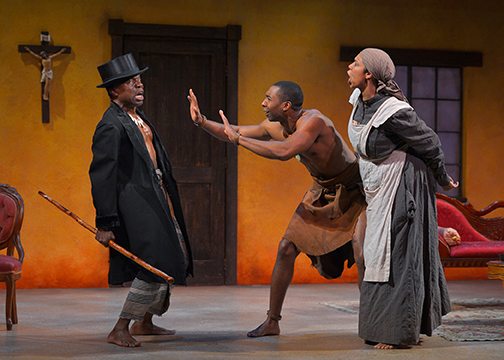By Charles Brousse
Right upfront, I have to admit that Othello is not among my favorite Shakespeare plays. It has a condescending, give-the-mob-what-it-wants feel of heavy melodrama, rather than the sharp but bracing edge of real tragedy.
Robert Currier, director of Marin Shakespeare Company’s season-closing production in Dominican University’s Forest Meadows Amphitheatre, references some of the problems in his program notes. Why does Iago, a ranking officer in the Venetian unit that Othello commands, bear such malice toward a man whose military victories have brought both of them fame and fortune? Because he didn’t get promoted in rank? Because an unrefined black man was able to win the affection of the beautiful Desdemona? Because a Moor, presumably a follower of Islam, was put in charge of commanding Christian troops in their struggle against the invading Turks? One can only guess—Iago simply professes his hatred to the audience at the beginning of the play and lets it go at that.
Equally inexplicable is the ease with which members of Othello’s inner circle allow themselves to be drawn into a web of treachery and deceit, when the ultimate objective is to persuade him to murder his beloved Desdemona, an act that would certainly destroy him as well. They include Cassio, a valiant young soldier and friend of the couple, who, after being lured into a drunken barroom brawl, allows Desdemona to plead on his behalf for the Moor’s pardon—a move with deadly consequences because it arouses Othello’s suspicions about her fidelity. There is Emilia, Iago’s wife and devoted attendant on Desdemona, who gives her husband a prized handkerchief accidently dropped by Desdemona; planted in Cassio’s room, it becomes physical proof of her guilt.
That’s only the beginning. In fact, just about all of the supporting characters seem completely clueless about how they are being used—but the play really isn’t about them. It’s about the perennial struggle between good and evil, waged by a pair of human protagonists who are larger than life. Knowing this, Currier made a couple of risky casting choices.
One of them appears to be working out spectacularly. To play Othello, Currier tapped Dameion Brown, a recently paroled inmate from California State Prison Solano, where he had been serving a sentence for domestic violence. Currier became acquainted with Brown a couple of years ago when the latter appeared as Macbeth’s nemesis Macduff in Marin Shakespeare Company’s Shakespeare for Social Justice program. Brown lacked training and had never even witnessed a professional theater production, let alone acted in one. But he had a burning desire to learn and, most importantly had the vocal, physical and intellectual resources to make him what in baseball lingo is called a “natural.” So, when a now free former convict called to say he’d like to be considered for Othello if the play were to be scheduled, Currier jumped at the opportunity [Editor’s note: For more on Brown’s journey, read our August 31 cover story, ‘Out of darkness’].
What followed was a furious crash course in diction, movement, projection in an outdoor venue, interaction with more experienced actors and mastery of the author’s poetic rhythms—in other words, the essentials of a Shakespearian actor. All the while, the media spotlight on this unusual event grew brighter and brighter. On opening night, it was apparent that the theater company’s gamble was well placed: Brown delivered a performance that will be long remembered for its power and emotional commitment.
Currier’s other risky casting choice, Cassidy Brown (no relation) as Iago, will likely stir some debate among those who expect the stereotypic villain. This Brown has made his name around the Bay Area as a comic actor who is far more accustomed to generating laughs than hisses. His amiable portrayal of Iago’s deadly schemes may seem hard to swallow, but I have to remind the doubters that there have been many murderers who seem like ordinary people until they cheerfully slit their victims’ throats.
Of course, Othello, the play, is more than these two performers. Among the principals, Luisa Frasconi is a fragile, almost ethereal Desdemona, Elena Wright has some great scenes as Emilia, and Jeff Wiesen is a stalwart presence as Cassio. Currier deserves plaudits for sticking with the script and keeping distractions to a minimum. All in all, it’s a strong account of one of Shakespeare’s most problematic works.
NOW PLAYING: Othello runs through September 25 in the Forest Meadows Amphitheatre, Dominican University, 890 Belle Ave., San Rafael; 415/499-4488; marinshakespeare.org.









